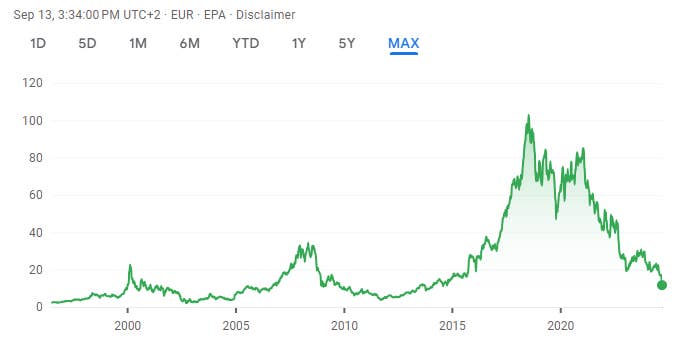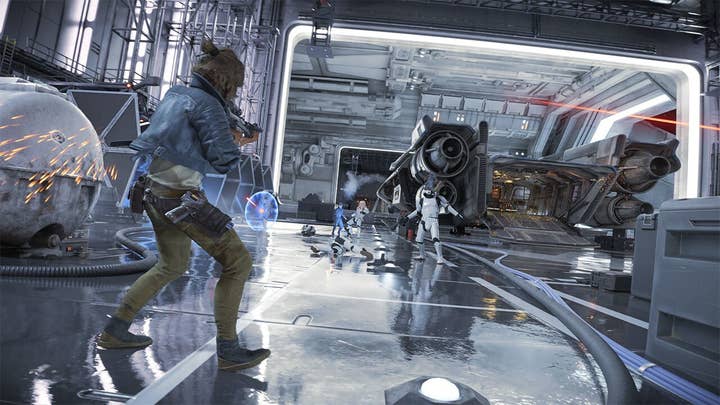Since its IPO nearly thirty years in the past, the company historical past of Ubisoft has been outlined, to some extent, by battles with varied makes an attempt to take over or wrest management of the corporate.
On the time of that IPO it was nonetheless primarily a European distributor for different firms’ video games, and the ambitions that might lead it to turn into a serious writer and developer of its personal titles have been nonetheless of their infancy. Inside only a few years, a collection of sensible selections had put Ubisoft firmly on the map as a worldwide writer with a handful of key IPs below its belt – which, in flip, put it within the crosshairs of bigger firms searching for to develop by way of acquisition.
EA purchased nearly 20% of the agency in 2004, which Ubisoft executives feared was the prelude to a hostile takeover try. EA in the end offered its shares in 2010, however only a few years later Ubisoft confronted a way more critical takeover try, with the founding Guillemot household participating in a three-year company battle to attempt to forestall media big Vivendi from gaining a controlling share of the corporate.
You’ll be able to see the marks these battles have left on the corporate simply by zooming out on its share worth graph. When you simply look again just a few years, Ubisoft’s share worth efficiency seems completely depressing, with the corporate having misplaced round half its worth previously yr, and usually having a wretched time of it yearly since 2020.

The pandemic-era spike in valuations for video games firms was extraordinarily short-lived for Ubisoft; it peaked in early 2021 and has tumbled precipitously since then. Its newest stumble got here previously couple of weeks with share costs dropping off once more within the wake of what seems to be a commercially disappointing launch for Star Wars: Outlaws.
Look again a bit additional, although, and also you see some much-needed context.
Ubisoft’s extremely excessive valuations within the years operating as much as 2020 have been largely a hangover from that company battle with Vivendi, which noticed the Guillemot household pulling out each trick within the guide to extend their shareholding and voting rights, whereas Vivendi paid more and more excessive costs to gobble up extra shares searching for the elusive 30% holding that might allow them to set off a young for a buyout.
These techniques labored; by the point Vivendi obtained close to that focus on in 2017, Ubisoft’s share worth had soared to nearly ten occasions increased than it was when Vivendi purchased its preliminary 10% of the inventory in 2015. Between that dramatic price ticket inflation and the Guillemots’ varied efforts to lock of their management over the corporate, Vivendi in the end gave up, promoting a bunch of its shares to Tencent because it departed the sector.
That left Ubisoft with an odd drawback – a share worth that had been inflated past cause by the company battling, and the inevitability of some very tough years on the inventory market to return as that worth inevitably regressed in direction of the imply.
Ubisoft stays an extremely essential a part of the video games panorama, and everybody working within the trade, particularly in Europe, would profit from it being in a more healthy and better-managed state
This isn’t to say that Ubisoft’s efficiency in subsequent years hasn’t been unhealthy by itself phrases – it has, actually, been fairly horrible. Ubisoft’s valuation now’s someplace close to to the place it was again in 2015 when Vivendi first began its bid. That is not simply imply regression; that is suggesting that the corporate hasn’t made significant progress previously decade (not less than within the admittedly jaundiced and infrequently myopic eyes of the inventory market).
Buyers in Ubisoft have, at finest, seen no return in any respect in that point; at worst, some have seen almost 90% of the worth of their funding worn out. The latest valuation slides, as one of many firm’s two nice hopes for this yr (the opposite being Murderer’s Creed: Shadows) has stumbled out of the gate, is simply insult to harm.
You’ll be able to nearly think about CEO Yves Guillemot feeling a bit of relieved, then, when a so referred to as activist investor got here out of the woodwork just a few days in the past with an open letter demanding, in essence, that Ubisoft provide itself up for takeover by a non-public fairness firm.
Right here, not less than, is a well-known battleground for Ubisoft’s management – a hostile investor threatening to power a takeover and defenestrate the founding Guillemot household! That is a boss battle they’ve fought very efficiently towards far more durable opponents than a minor investor no one has ever heard of and who, by his personal admission, has owned lower than 1% of Ubisoft for about two weeks.
It is a far preferable battle to the interior soul-searching Ubisoft actually must be doing about why it is falling to date behind its trade rivals by so many industrial metrics, and what’s gone improper with the administration of its growth pipeline.
I might truly counsel that you just go and skim the open letter in question, as a result of the reporting in each the monetary and specialist press has arguably been a bit of too form to its creator. It is amateurish stuff for essentially the most half, studying extra like an power drink-fuelled publish on notorious meme-stock spawning floor r/WallStreetBets than a critical piece of study or funding technique. From persistently misnaming a few of Ubisoft’s most essential IPs to betraying an especially surface-level understanding of how the video games enterprise truly works, it is probably not the sort of letter a serious firm or its buyers must be taking severely.

Completely unsurprisingly, the prescription supplied for all that ails Ubisoft seems to be precisely the identical snake oil that is hawked as a company cure-all in each enterprise – promote out to non-public fairness, who will proceed to slash headcount, dump varied studios and different property, and little doubt shake their heads in unhappy shock just a few years down the road when the drained husk of the corporate collapses in on itself.
And but. For all that this open letter has little to supply both in analysis or prescription for Ubisoft’s illnesses… Properly, the core thesis that the illnesses are unhealthy and displaying no signal of enchancment is not improper, is it?
The essential information are clear; Ubisoft does not stack up nicely with its writer friends by way of its industrial success. It underperforms by nearly any metric, actually; whether or not you take a look at backside line monetary numbers, or slice them up in response to revenue-per-headcount, or take into account the industrial efficiency on a per-title foundation, Ubisoft does not match as much as different firms within the trade.
It has a strong set of well-known and widespread IPs – Murderer’s Creed, Prince of Persia, Tom Clancy, Far Cry, and so on. – but it surely has persistently struggled lately to translate that into critical industrial success. Makes an attempt to develop new IP have not gone nicely of late; Cranium & Bones is the costliest and high-profile cock-up by some margin, however even with seemingly untroubled and easy growth cycles, tasks like XDefiant (an try and construct a Name of Responsibility competitor) have seemingly did not hit industrial targets.
These issues aren’t distinctive to Ubisoft, in fact. Numerous firms have tasks that descend into the depths of growth hell – although normally not for fairly as lengthy, or in fairly such a dramatic approach, as Cranium & Bones did – and nearly each firm within the trade has blotted its copybook with an try to grab away some market share from a money-printing machine like Name of Responsibility or Fortnite lately.
Ubisoft’s core drawback is that it lacks its personal money-printing machine, a enterprise pillar like Activision’s Name of Responsibility, EA’s sports activities video games, or Take Two’s GTA On-line
You could possibly argue that that is truly a touch as to Ubisoft’s core drawback: it lacks its personal money-printing machine, a enterprise pillar like Activision’s Name of Responsibility, EA’s sports activities video games, or Take Two’s GTA On-line, which reliably churn out giant quantities of money yr after yr. Most of Ubisoft’s strategic selections make some sort of sense should you view them as makes an attempt to search out such a enterprise of their very own, although a much less charitable take would notice that these makes an attempt have usually been fairly poor – XDefiant is arguably the most effective of them, however its odds of snatching market share from Name of Responsibility by no means regarded particularly good.
Ubisoft does have success tales, in fact – that is nonetheless an organization with billions in income, let’s not fake it is a sinking ship – however buyers aren’t improper to assume that efficiency could possibly be loads higher.
There is a truthful argument to be made that Ubisoft is a bloated firm – its headcount is way increased than comparable rivals within the trade, though partially that is due to a philosophy of retaining growth in-house to a big extent, whereas many different publishers’ true headcount is disguised by their intensive use of outsourcing.
That does not inform the total story, although – even provided that caveat, it stays the case that Ubisoft has a hell of a variety of workers and publishes a hell of a variety of video games, however fails to generate revenues on a per-employee or per-game foundation that evaluate to rivals. That means an issue at a excessive stage throughout the firm; an editorial drawback. Selections being made at an government stage are failing to focus the corporate’s efforts successfully; video games are being made en masse and thrown at a wall to see what is going to stick, which displays a failure to utilise assets productively and make sensible selections concerning the product pipeline.

That leads us, inevitably, again to the very high of the corporate – to Yves Guillemot and to the executives round him, and the household that has fought so arduous to take care of its grip on Ubisoft over the a long time.
If Ubisoft’s issues are editorial, nicely, the final word arbiter of editorial decision-making at a writer is the CEO – particularly a founder-CEO that has reigned for greater than 30 years and whose household wields such energy throughout the firm. Guillemot has really fought tooth and nail to remain on the high of Ubisoft for all these years, and has proven himself to be a artful and resourceful boardroom warrior, utilizing each device at his disposal to manoeuvre between big companies like EA, Vivendi, and Tencent, even turning their power towards each other occasionally to go well with his functions.
But that talent is not the identical because the talent and perception required to direct a product slate or make good strategic selections for the place a recreation writer’s assets must be centered. It isn’t unfair for buyers to query whether or not the present management has actually been displaying these expertise of late.
Ubisoft’s share worth had been inflated past cause by years of company battling
The remedy on provide from the activist investor, in fact, is way worse than the illness. A non-public fairness agency coming in to fireside workers and strip property could be the demise knell for Ubisoft within the medium time period. Promoting out to non-public fairness is the company equal of sending the horse to the glue manufacturing unit, not some magical pathway to improved administration and oversight.
Ubisoft stays an extremely essential a part of the video games trade panorama, and everybody working within the trade, particularly in Europe, would in the end profit from it being in a more healthy and better-managed state – which won’t be achieved by bringing in a bunch of fresh-faced MBA-wielders to slash and burn. It might, nevertheless, even be arduous to attain that more healthy and better-managed state with out actual change on the high of the corporate.
After a bruising and poorly-handled collection of revelations in 2020 that uncovered an abusive tradition encompassing many senior workers, Ubisoft’s management was hollowed out, however Guillemot remained in place; since then the corporate has pivoted first to a deal with cellular and F2P, then to an ill-advised dedication to blockchain, all of the whereas with a product line-up wanting more and more in want of rather more efficient editorial oversight.
With such a strong CEO, there’s just one desk for the buck to cease on. Yves Guillemot has devoted a lot of his life to constructing this firm, however buyers and stakeholders are justified in asking, not less than, that he correctly display that he is nonetheless the correct particular person to guide it by way of its present challenges.
